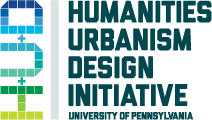H+U+D Invites Applications for 2021-22 Junior Fellows—12.02.20
Mellon Junior Fellows 2021-22
Application deadline: January 29, 2021
The initiative in Humanities, Urbanism, and Design (H+U+D) at the University of Pennsylvania is a ten-year project funded by the Andrew W. Mellon Foundation to foster critical and integrative considerations of the relationship between the humanities and the design professions in the analysis and shaping of the built environment. Under the renewed grant (beginning in 2018), the initiative takes “The Inclusive City” as its theme, focusing on issues of inclusivity and diversity. The program has a number of component parts, including a bi-weekly Faculty Colloquium, the sponsorship of graduate and undergraduate courses, student research funding, an Undergraduate Colloquium, special lectures, participation in conferences, a Doctoral Dissertation (ABD) Fellowship program, and a Junior Fellowship program. For more information on the initiative see: https://www.humanitiesurbanismdesign.com
Applications are now invited for two one-year Junior Fellowships to be held in 2021-22. One fellow will be selected from the humanities and one from design-related fields such as planning, architecture, and landscape. Each will be hosted at Penn by a department in the other discipline.
Mellon Junior Fellows will be selected on the basis of their ability to contribute, through research and teaching, to the interdisciplinary aims of the initiative. Preference will be given to projects related to the “Inclusive City” theme. During their nine months in residence, Junior Fellows will have the opportunity to pursue their own research. They will participate in the bi- weekly Colloquium, present their research at one of the Colloquium sessions, and will participate fully in the academic life of their host departments. In the spring semester they will teach an undergraduate seminar, which may be co-taught by the two fellows.
Eligibility
Applications are invited from junior scholars in all humanistic and design disciplines whose work deals with the built environment of cities, landscapes, and architecture, in relation to the Mellon initiative’s theme focusing on diversity and inclusion. Applicants for 2021-22 will hold a PhD that was defended no later than December 2020 and who will have held the PhD degree for no longer that 10 years on September 1, 2021. Candidates may hold tenure-track positions but may not be tenured at the time of application or during the fellowship year. Applications are welcome from scholars of all nationalities and academic affiliations.
The University of Pennsylvania values diversity and seeks talented students, faculty and staff from diverse backgrounds. The University of Pennsylvania does not discriminate on the basis of race, color, sex, sexual orientation, gender identity, religion, creed, national or ethnic origin, citizenship status, age, disability, veteran status or any other legally protected class status in the administration of its admissions, financial aid, educational or athletic programs, or other University-administered programs or in its employment practices.
Terms of appointment
The fellowship stipend is $55,000. Health insurance will be provided for fellows but not for family and dependents. Fellows may employ the stipend to supplement their sabbatical salaries. As participants in the Colloquium, they will receive a research fund of $2,500, which will be disbursed according to University guidelines.
Fellows are required to be in residence in Philadelphia during the academic year in which the fellowship takes place (August 31, 2021–May 16, 2022).
Application Guidelines
Applications and letters of reference must be received by January 29, 2021. These materials should be sent to Ms. Alisa Chiles, H+U+D Program Manager (mellon-hud-initiative@groups.sas.upenn.edu).
Applications should be assembled as one PDF comprising
1. cover sheet (template is downloadable here: HUD Junior Fellow Application Cover Sheet)
2. curriculum vitae
3. research proposal (750 words maximum)
4. undergraduate seminar proposal (200-word description plus syllabus)
Your PDF and the email that conveys it should be titled <Your last name> HUD application; e.g., Chakrabarty HUD application
Also arrange to have three letters of reference, which discuss your research proposal, sent directly to Ms. Chiles (mellon-hud-initiative@groups.sas.upenn.edu) by the application due date of January 29. The letters should be in the form of PDFs, and the PDFs and the emails that convey them should be titled
<Your last name>_<Reference writer’s last name> HUD reference; e.g., Chakrabarty_Ramirez HUD reference
Address questions to
Daniel A. Barber barberda@design.upenn.edu or Andrea Goulet agoulet@sas.upenn.edu
Download Application Cover Sheet

 Ty Redden joins the Mellon H+U+D Initiative from Gettysburg College, where she was Assistant Professor of Africana Studies. She is a graduate of Savannah State University and the University of Florida, having earned a Ph.D. in Design, Construction & Planning with specializations in race studies and housing policy. Her research explores development-forced displacement driven by mega-sporting events. Ty is a frequent presenter at the Association of Collegiate Schools of Planning and the Urban Affairs annual conferences, and is co-author of “Building the Foundation for Arnstein’s Ladder: Community Empowerment through a Participatory Neighborhood Narrative Process” in the forthcoming volume, Learning from Arnstein’s Ladder: From Citizen Participation to Public Engagement (co-edited by M. Lauria and C. Slotterback). She is appointed in the Department of Africana Studies (School of Arts and Sciences).
Ty Redden joins the Mellon H+U+D Initiative from Gettysburg College, where she was Assistant Professor of Africana Studies. She is a graduate of Savannah State University and the University of Florida, having earned a Ph.D. in Design, Construction & Planning with specializations in race studies and housing policy. Her research explores development-forced displacement driven by mega-sporting events. Ty is a frequent presenter at the Association of Collegiate Schools of Planning and the Urban Affairs annual conferences, and is co-author of “Building the Foundation for Arnstein’s Ladder: Community Empowerment through a Participatory Neighborhood Narrative Process” in the forthcoming volume, Learning from Arnstein’s Ladder: From Citizen Participation to Public Engagement (co-edited by M. Lauria and C. Slotterback). She is appointed in the Department of Africana Studies (School of Arts and Sciences). Syantani Chatterjee, who recently completed her PhD in Anthropology at Columbia University, is an anthropologist specializing in questions of urban citizenship and belonging in India. Her book project, which builds on her dissertation, examines the social worlds of the residents of Shivaji Nagar (Mumbai), also known as “Bombay’s Gas Chamber.” Her interest in exposure, and embodiment is reflected in her earlier field research among commercial gestational surrogates in India. In her award-winning Master’s Thesis at Columbia University, Caste in a New Mold: The rematerializing of caste in the biomedical universe of commercial surrogacy in India, she studied the emergence of new configurations of caste, and the endurance of earlier forms of the same in contemporary India, from within biomedical practices and discourses. Prior to pursuing doctoral studies, Chatterjee worked as a journalist for Reuters, the Associated Press and CNN. Her scholarship has received generous support from the American Institute for Indian Studies, Columbia University’s Lindt Dissertation Fellowship, and other endowments. Her publications appear in the International Journal of Labor and Working Class History, and PoLAR. She is appointed in the Department of Landscape Architecture (Weitzman School of Design).
Syantani Chatterjee, who recently completed her PhD in Anthropology at Columbia University, is an anthropologist specializing in questions of urban citizenship and belonging in India. Her book project, which builds on her dissertation, examines the social worlds of the residents of Shivaji Nagar (Mumbai), also known as “Bombay’s Gas Chamber.” Her interest in exposure, and embodiment is reflected in her earlier field research among commercial gestational surrogates in India. In her award-winning Master’s Thesis at Columbia University, Caste in a New Mold: The rematerializing of caste in the biomedical universe of commercial surrogacy in India, she studied the emergence of new configurations of caste, and the endurance of earlier forms of the same in contemporary India, from within biomedical practices and discourses. Prior to pursuing doctoral studies, Chatterjee worked as a journalist for Reuters, the Associated Press and CNN. Her scholarship has received generous support from the American Institute for Indian Studies, Columbia University’s Lindt Dissertation Fellowship, and other endowments. Her publications appear in the International Journal of Labor and Working Class History, and PoLAR. She is appointed in the Department of Landscape Architecture (Weitzman School of Design).
